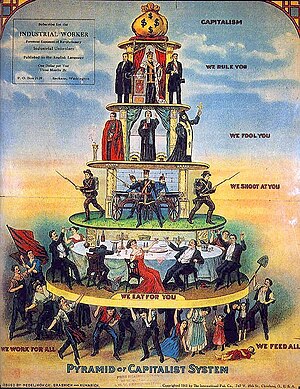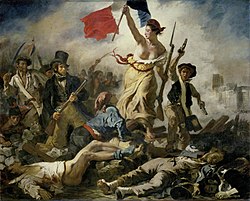
Back Klassenkampf ALS الصراع الطبقي Arabic Llucha de clases AST Sinfi mübarizə Azerbaijani Класавая барацьба Byelorussian Класова борба Bulgarian Emgann ar renkadoù Breton Lluita de classes Catalan ململانێی چینایەتی CKB Třídní boj Czech

| Part of a series on |
| Political revolution |
|---|
 |
|
|
In political science, the term class conflict, or class struggle, refers to the economic antagonism and political tension that exist among social classes because of clashing interests, competition for limited resources, and inequalities of power in the socioeconomic hierarchy.[1] In its simplest manifestation, class conflict refers to the ongoing battle between rich and poor.[2]
In the writings of Karl Marx and Mikhail Bakunin, class struggle is a core tenet and a practical means for effecting radical sociopolitical transformations for the majority working class.[3] It is also a central concept within conflict theories of sociology and political philosophy.
Class conflict can reveal itself through (a) direct violence, such as assassinations, coups, revolutions, counterrevolutions, and civil wars for control of government, natural resources, and labor; (b) indirect violence, such as deaths from poverty, malnutrition, illness, and unsafe workplaces; (c) economic coercion, such as boycotts and strikes, the threat of unemployment and capital flight, the withdrawal of investment capital; (d) political machinations through lobbying (legal and illegal), bribery of legislators, voter suppression and disenfranchisement; and (e) ideological struggle by way of propaganda and political literature.[1]
In the economic sphere, class conflict is sometimes expressed overtly, such as owner lockouts of their employees in an effort to weaken the bargaining power of the employees' union; or covertly, such as a worker slowdown of production or the widespread, simultaneous use of sick leave (e.g., "blue flu") to protest unfair labor practices, low wages, poor work conditions, or a perceived injustice to a fellow worker.[4]
- ^ a b Isaac, Larry W.; Harrison, Daniel M.; Lipold, Paul F. (2022). "Class Conflict in Capitalist Society". Encyclopedia of Violence, Peace, & Conflict. pp. 118–136. doi:10.1016/B978-0-12-820195-4.00248-X. ISBN 978-0-12-820312-5.
- ^ Tavernise, Sabrina (11 January 2012). "Survey Finds Rising Perception of Class Tension". The New York Times.
- ^ Bullock, Allan; Trombley, Stephen, eds. (1999). "class conflict". The New Fontana Dictionary of Modern Thought. HarperCollins. p. 127. ISBN 978-0-00-255871-6.
- ^ Parenti, Michael (1993). Land of Idols: Political Mythology in America. St. Martin's Press. pp. 66–67. ISBN 978-0-312-09841-4.
© MMXXIII Rich X Search. We shall prevail. All rights reserved. Rich X Search